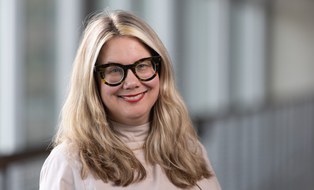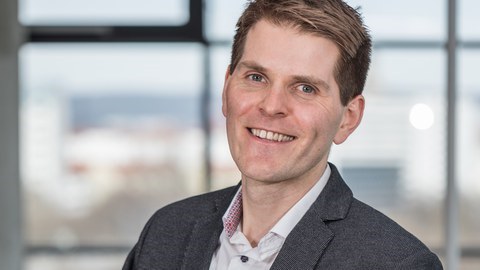29.09.2025
Dr. Benjamin Kruppke im Interview: „Vernetzung bedeutet für mich gemeinsam Neues schaffen"
An der TU Dresden gestalten Connected Communities (CCs) den internationalen Hochschulalltag aktiv mit. Lehrende und Forschende aus verschiedenen Ländern entwickeln in diesem Zusammenhang gemeinsame Lehr- und Forschungsformate. Diese werden jeweils von einer aktiven Leitungsperson koordiniert. Eine dieser Communities wird von Dr. Benjamin Kruppke, Materialwissenschaftler an der TU Dresden, geleitet. Seine Community „Agile in Biomechanics“ beschäftigt sich mit agilen Lehrformaten, interdisziplinärer Projektarbeit und europäischer Hochschulentwicklung.
Im Interview erzählt Dr. Kruppke, wie aus einer einzelnen Lehridee ein internationales Kooperationsprojekt wurde und welche Bedingungen dafür entscheidend sind.
Von der Idee zur Community
„Ich bin nicht mit dem Ziel gestartet, eine Community zu leiten“, sagt Dr. Kruppke rückblickend. Was als kollegialer Austausch begann, entwickelte sich rasch zu einem konkreten Projekt – mit einem agilen Lehrkonzept, einem internationalen Team und regelmäßigem Austausch über Landes- und Fachgrenzen hinweg.
Kernstück der Dresdner Connected Community ist das „Kompetenzatelier“, eine projektbasierte Lehrveranstaltung für fortgeschrittene Studierende. Hier bearbeiten kleine Teams reale Fragestellungen aus der Biomechanik, Materialforschung oder Medizintechnik. Sie arbeiten eigenständig, wenden agile Methoden wie Scrum an und reflektieren ihre Prozesse in sogenannten Retrospektiven. Begleitet wird dies durch Inputs zu Kommunikation, Aufgabenverteilung und Projektorganisation. Ziel ist es, neben Fachwissen auch überfachliche Kompetenzen zu vermitteln, etwa Teamverantwortung und Selbstorganisation.
„Wir haben gemerkt, wie stark sich das Denken der Studierenden verändert, wenn sie wirklich Entscheidungen treffen müssen – nicht im Kleinen, sondern im Gesamtprojekt“, so Kruppke.
Der Weg in die EUTOPIA-Welt
Die Idee, dieses Format international weiterzuentwickeln, führte Dr. Kruppke zu EUTOPIA. Er wurde in der zweiten von drei Förderrunden als Lead einer Connected Community an der TU Dresden ausgewählt. „Ich war überrascht, wie offen und machbar der Einstieg war. Der Antrag war kurz, die Idee gut vorbereitet.“ Mit Unterstützung der TU Dresden, insbesondere durch Local Facilitator Kerstin Le Merdy, entstand ein Antrag, der zeigen sollte, wie sich das Dresdner Modell in andere Kontexte übertragen lässt.
Heute arbeitet die Community mit Partnern aus der University of Warwick (Großbritannien), der Universitatea Babeș-Bolyai in Cluj-Napoca (Rumänien), der Vrije Universiteit Brussel (Belgien) und der Ca’ Foscari Universität in Venedig (Italien) zusammen. Die Gruppe ist interdisziplinär aufgestellt, mit Beteiligten aus der Biomechanik, Orthopädie, Elektrotechnik und Soziologie.
Agile Lehre als Experimentierraum
Die Zusammenarbeit in der Community „Agile in Biomechanics“ bietet Kruppke und seinen Studierenden Raum, um agile Lehre aus unterschiedlichen Blickwinkeln weiterzudenken. Dabei geht es nicht nur um die konkrete Durchführung der Lehrveranstaltung, sondern auch um die Reflexion der zugrunde liegenden Methoden und um die Frage, wie diese in verschiedenen Hochschulkontexten funktionieren könnten.
Innerhalb der Community wurden auch erste Ideen diskutiert, wie sich das Lehrkonzept künftig für andere Zielgruppen, etwa Promovierende, weiterentwickeln ließe. Der Schwerpunkt lag bisher jedoch klar auf der Umsetzung mit Studierenden und dem Aufbau einer tragfähigen Zusammenarbeit im internationalen Partnernetzwerk.
Herausforderungen und Aha-Momente
Natürlich verlief nicht alles reibungslos. Besonders im internationalen Kontext stößt Zusammenarbeit oft an strukturelle Grenzen. Ein Beispiel: Nur die leitende Person einer Connected Community, der sogenannte Lead, erhält Budgetmittel für das Projekt. Die Partnerinstitutionen erhalten formal kein eigenes Geld, wenngleich eine Verteilung der Mittel vorgesehen ist. „Das macht es schwieriger, dass sich alle gleichermaßen verantwortlich fühlen – nicht aus Desinteresse, sondern aus strukturellem Pragmatismus“, erklärt Dr. Kruppke.
Und doch funktioniert die Zusammenarbeit – auch weil Vertrauen gewachsen ist. Ein großer Mehrwert zeigt sich für Kruppke darin, wie unkompliziert und verlässlich mittlerweile gemeinsam gearbeitet wird: „Wenn ich morgen ein EU-Projekt planen würde, wüsste ich genau, wen ich anspreche und dass ich auch eine Antwort bekomme.“
Darüber hinaus entstehen oft informell neue Impulse für Forschungsanträge, Curricula oder die Zusammenarbeit mit Praxispartnern. „Diese langfristige Wirkung ist etwas, das man am Anfang gar nicht planen kann, aber sie entwickelt sich mit der Community.“
Abschied und Ausblick
Im Herbst verlässt Dr. Kruppke die TU Dresden und folgt dem Ruf der Friedrich-Schiller-Universität Jena auf eine Professur. Er übergibt das Projekt an eine Kollegin Frau Dr. Franziska Alt, die auch das Kompetenzatelier weiterführen wird. Die Community soll weiterhin aktiv bleiben.
Kruppkes Wunsch: „Ich hoffe, dass sich die Studierenden an diese Lehrveranstaltung erinnern – nicht nur wegen des Themas, sondern weil sie wirklich etwas gelernt haben. Und wenn jemand aus der Community sagt: ‚Wir möchten das bei uns einführen. Hilfst du uns?‘, dann wäre das für mich ein echter Erfolg.“
 © Sven Ellger
© Sven Ellger
Projektmitarbeiterin
NameKerstin Le Merdy
EUTOPIA MORE Local Facilitator
Eine verschlüsselte E-Mail über das SecureMail-Portal versenden (nur für TUD-externe Personen).

